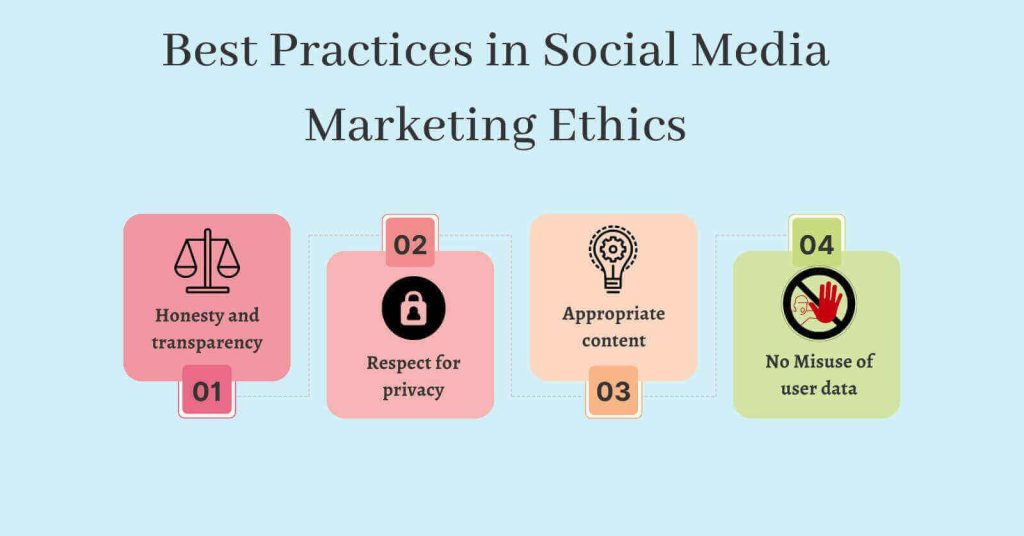Social media marketing uses social media platforms such as Facebook, Twitter, Instagram, and LinkedIn to promote products, services, or brands. With over 3 billion active users worldwide, social media has become a powerful tool for businesses to reach and engage with their target audience. However, the growth of social media marketing has brought new ethical considerations that companies must address. The importance of ethics in social media marketing cannot be overstated.
Importance of ethics in social media marketing
The importance of ethics in social media marketing cannot be overstated. Social media marketing involves the collection and use of personal data, and companies must be transparent about how they use this information. Companies must also ensure that their marketing messages are truthful, respectful, and appropriate. Failing to prioritize ethics in social media marketing can lead to negative consequences, including loss of customer trust, damage to reputation, and decreased revenue.
It will explore the ethical challenges that companies face in the digital age and provide guidance on how to navigate these challenges and promote ethical behavior in social media marketing. By prioritizing ethics, companies can build strong customer relationships, protect their reputation, and foster long-term success.
Overview of social media marketing ethics
Ethics refers to the moral principles and values that guide the behavior of individuals and organizations. Ethics in marketing refers to companies’ responsibility to be honest, transparent, and respectful in their marketing practices. Companies must consider the impact of their marketing activities on customers, society, and the environment and act in ways that promote the greater good.
What are ethics?
Social media marketing ethics builds upon these broader principles of marketing ethics and applies them to the specific context of social media. Companies must be mindful of using social media platforms to reach and engage with customers and ensure their practices are ethical and responsible. This includes being transparent about the use of personal data, avoiding misleading or false advertising, and being respectful of the privacy of users.
What are ethics in social media marketing?
The growth of social media has led to new ethical challenges that companies must address. For example, the rise of influencer marketing has raised questions about the responsibility of companies to ensure that influencer promotions are truthful and not misleading. The sheer volume of user-generated content on social media also presents new ethical considerations, as companies must balance their responsibility to protect users from harmful content with the need to allow for free speech and expression. Navigating these challenges requires a strong commitment to ethics and a deep understanding of social media marketing best practices.
Best practices in social media marketing ethics
Companies must adhere to best practices that prioritize honesty, transparency, and respect to promote ethical behavior in social media marketing. These best practices include:

A. Honesty and transparency:
Companies must be honest and transparent about their marketing practices and the use of personal data. This includes clearly communicating their privacy policy and being upfront about data collection and usage. Companies must also avoid misleading or false advertising and ensure their marketing messages are truthful and accurate.
B. Respect for privacy:
Companies must respect the privacy of their customers and users. This includes protecting personal data, avoiding the unauthorized use of user-generated content, and being mindful of the information that they share on social media.
C. Appropriate content:
Companies must ensure that their marketing messages and content are appropriate and respectful. This includes avoiding hate speech, harassment, and any other harmful or offensive content.
D. Responsibility for user-generated content:
Companies must take responsibility for the content that users generate on their platforms. This includes monitoring for harmful or inappropriate content and taking prompt action to remove it. Companies must also ensure that their reporting and moderation policies are effective and transparent.
Common ethical challenges in social media marketing
Social media marketing can present many ethical challenges that companies must navigate to promote responsible and respectful behavior. These common ethical challenges include:
A. Misrepresentation:
Companies must be careful to avoid misrepresentation in their marketing messages and advertisements. This includes avoiding false or misleading claims, as well as using deceptive tactics such as astroturfing or fake reviews.
B. Misuse of user data:
Companies must be transparent about their use of personal data and ensure that they are using it ethically and responsibly. This includes protecting user privacy and avoiding the unauthorized use of personal information.
C. Online harassment and hate speech:
Companies must take action to address online harassment and hate speech on their platforms. This includes implementing effective reporting and moderation policies and promptly removing harmful or inappropriate content.
D. Influencer marketing:
Companies must be careful to ensure that influencer marketing campaigns are truthful and not misleading. This includes ensuring that influencer disclosures are clear and prominent and avoiding using fake followers or bots to inflate influencer reach.
By being aware of these common ethical challenges, companies can take steps to promote responsible and respectful behavior in social media marketing and build strong relationships with their customers.
How to deal with ethical dilemmas in social media marketing
To effectively deal with ethical dilemmas in social media marketing, companies must take a proactive approach that prioritizes transparency, accountability, and responsible behavior. Some key strategies for dealing with ethical dilemmas include:
A. Developing a code of conduct:
Companies can develop a code of conduct that clearly outlines their expectations for ethical behavior in social media marketing. This code should be communicated to employees, influencers, and other stakeholders and regularly reviewed and updated to reflect changes in the industry.
B. Establishing a reporting system:
Companies should establish a reporting system that allows customers, employees, and other stakeholders to raise concerns about unethical behavior. This reporting system should be accessible, easy to use, and protected by privacy and confidentiality policies.
C. Providing ongoing training:
Companies should provide ongoing training to their employees, influencers, and other stakeholders to promote responsible and ethical behavior in social media marketing. This training should cover key topics such as privacy, data security, and appropriate content creation and dissemination.
D. Taking prompt action when unethical behavior is detected:
Companies must take prompt action when unethical behavior is detected in their social media marketing practices. This may include revising marketing campaigns, removing inappropriate content, or addressing concerns raised by customers or employees. Companies must be transparent about their actions and should regularly review and assess their practices to ensure that they remain ethical and responsible.
By following these strategies, companies can navigate ethical dilemmas in social media marketing and promote responsible and respectful behavior in a constantly evolving industry.
Conclusion
Summing up, ethics thics play a critical role in the success of social media marketing. Companies must prioritize transparency, responsibility, and respect to build strong relationships with their customers and maintain their credibility in the industry.
As the social media industry continues to evolve, it is more important than ever for companies to prioritize ethics in their marketing practices. This means being transparent about their use of personal data, avoiding false or misleading claims, and taking prompt action to address online harassment and hate speech.
Therefore, we call on social media marketers to prioritize ethics in their practices and to take a proactive approach to promote responsible and respectful behavior in the industry. By doing so, they can build strong relationships with their customers, protect their reputation, and contribute to the overall health and well-being of the online community.
Explore More:
Unwrapping Top Secrets of SEO In 2023

Leave a Reply